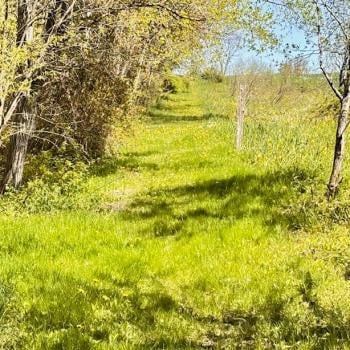It seems odd to me to be sitting at my computer on a dismal, rainy, dreary April day, with the chill in the air serving as a palpable reminder that spring isn't quite here yet, and writing about Beltane. Beltane is supposed to be about celebration, passion, fertility, prosperity, magic, heat, and yes, sex. Yep. Beltane is about sex (at least in part) and on days like today, that type of joyous celebration seems very far away. Still, if you'll pardon the inevitable pun, Beltane is coming and like any of our other holy tides, it deserves a bit of thought.
I've been dreading writing this particular column for the past week or so, ever since I realized that Beltane and Walpurgis were right around the corner. This is the tail end of the school year for me (I'm in graduate school again) and papers are due, exams must be prepared for, then of course there are all the professional writing deadlines that are piling up. Thinking about what I've always considered a rather 'happy-go-lucky' holiday was not on my personal agenda of things I wanted to be doing (or had the time to do).
Still, even for me, misanthropic and overworked though I sometimes may be, it's difficult not to get pulled into the energetic momentum of this time. With Beltane after all, we lay to rest, once and for all, the inertia of the preceding winter. What began with the land's seemingly lazy resistance to the inevitable pull of spring bursts full force into bloom with the turning of the seasonal wheel to May.
At its core, Beltane is about planting. At Ostara we honored the readiness of the land to receive the seed; at Beltane we actually plant those seeds, be they literal or metaphorical. At Ostara we celebrated the potential fertility of the land, at Beltane we revel in its actuality.
This is kind of where the sex part of things comes in. Beltane is about life, growth, and all the messiness of unrestrained passion. It's about the joining of seed to soil, body to body, physicality to physicality, and the potential joining of sperm to egg. It's about bringing forth new life, new possibilities, new reasons to celebrate one's traditions.
This is a time when the land, at least for us Northern Tradition folks, was traditionally blessed by happy couples having sex in fields, on the soil where their fluids and carnal enjoyment of each other only served to feed the land itself and further ensure its blossom. The May pole, a symbol we all know and love, is (as any fan of the original Wicker Man knows) "a phallic symbol." The magic of Beltane is held forth in the erect penis and spurting seed, and in our bodies' ability to experience pleasure. This, more than any other holy tide reminds us that living is cause for celebration. There is pleasure in being alive, pleasure that, at the appropriate times, can and should be indulged.
Far more than being about the celebrating the penis (or the vulva, or any other body part—not that there's anything wrong with that; celebrate away, folks), I would interpret the wisdom and 'medicine' of this holiday on a broader level. I believe Beltane reminds us that our bodies are sacred. In the Northern Tradition the physical container of the soul is so valued that it's actually considered part of the soul matrix.
That's right: each physical vessel of incarnation is intimately connected to one's soul, an integral part of it. We're incarnate for a reason. Our bodies are the tools and conduits by and through which we experience everything, including the Divine. Moreover, they may even be the way the Gods experience us, spirituality being, like so many things, a two-way street. Far from needing to escape from the flesh, Beltane reminds us that there's an awful lot of wisdom inherent in being in the flesh too.
One of the Goddesses commonly honored within the Northern Tradition at this time is the Goddess Freya. She is a tremendously powerful Goddess, associated with sexuality, eroticism, passion, battle and war, fierce fighting, cunning strategy, prosperity and wealth, physical beauty, and witchcraft and sorcery. One of Her primary and most important lessons is about knowing one's own worth (and being unwilling to compromise that in any way).
That can be a hard, hard lesson for many people today (especially, I hate to say it, for women). Freya's lessons often involve self-satisfaction and confidence in one's physical being (and I'm not talking just about sexuality here). This is a Goddess who knows how to celebrate the flesh, both its passion and its power. Here is a Goddess not afraid to take up space, claim Her territory, defend Her territory, and own Her strength. Here is a Goddess who can teach Her devotees to say "where I stand is holy ground" and mean it.
Beltane's call is a call to that type of commitment and courage. It reminds us that our physicality is sacred, no matter what messages we may imbibe from our families, our culture, or the media. We're called to stand up and live our truth. Learning to express ourselves well physically and kinetically, learning to have both trust and confidence in our bodies is part of honoring this tremendous gift that we've been given. It's part of living our truth.





